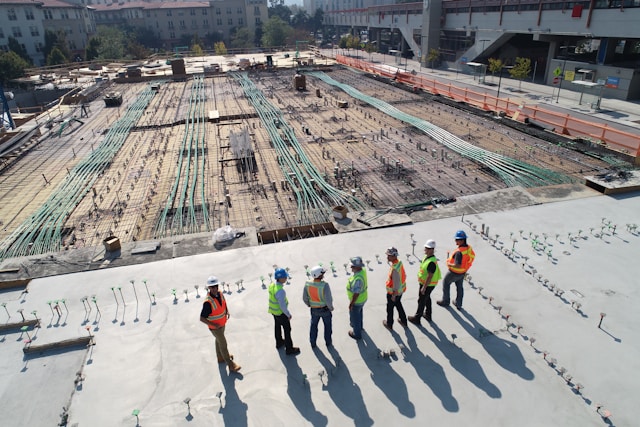- Change theme
Streamlining Construction Projects with Procurement Software

This article explores the key features, benefits, and trends of construction procurement software, highlighting how it can enhance project delivery.
16:18 03 December 2024
The construction industry is characterized by complexity, tight deadlines, and the need for seamless collaboration among various stakeholders. Effective procurement processes are critical to ensuring that projects stay on track and within budget. Construction procurement software has emerged as a game-changer, enabling construction firms to streamline their procurement processes, improve efficiency, and reduce costs. This article explores the key features, benefits, and trends of construction procurement software, highlighting how it can enhance project delivery and collaboration.
What is Construction Procurement Software?
Construction procurement software is a specialized tool designed to facilitate the acquisition of goods, services, and subcontractor services needed for construction projects. It helps construction firms manage the entire procurement process, from sourcing and purchasing to invoicing and payment. This software can range from standalone solutions focused solely on procurement to comprehensive construction management platforms that integrate procurement with other project management functions.
Key Features of Construction Procurement Software
- Supplier Management:
- Effective procurement software provides tools for managing supplier information, including contact details, performance history, and compliance documentation. This feature helps construction firms build strong relationships with reliable suppliers and subcontractors.
- Request for Quotation (RFQ) Management:
- Construction procurement software streamlines the RFQ process by allowing users to create, send, and track RFQs electronically. This automation reduces manual paperwork and improves response times from suppliers.
- Purchase Order (PO) Management:
- The software enables users to create and manage purchase orders, ensuring accurate and timely procurement of materials and services. Users can track order status, delivery timelines, and any changes to the original order.
- Budget Management:
- Construction procurement software provides tools to track spending against project budgets, allowing teams to monitor financial performance in real time. This helps prevent budget overruns and ensures better financial planning.
- Document Management:
- A central repository for all procurement-related documents, including contracts, invoices, and compliance documents, simplifies document retrieval and sharing. This feature enhances collaboration among project stakeholders.
- Collaboration Tools:
- Construction procurement software often includes construction estimating software features that facilitate communication and collaboration among project teams, suppliers, and subcontractors. This ensures that everyone is on the same page and can quickly address any issues that arise.
- Analytics and Reporting:
- Advanced analytics and reporting features provide insights into procurement performance, supplier reliability, and spending patterns. This data helps construction firms make informed decisions and optimize procurement strategies.
- Integration Capabilities:
- Construction procurement software can often integrate with other project management tools, accounting software, and ERP systems, creating a unified platform for managing all aspects of construction projects.
Benefits of Using Construction Procurement Software
- Increased Efficiency:
- Automation of procurement processes reduces manual tasks and paperwork, allowing teams to focus on higher-value activities. This increased efficiency translates into faster project delivery and improved productivity.
- Cost Savings:
- By streamlining procurement processes, construction firms can reduce administrative costs and minimize delays. Additionally, better supplier management leads to more competitive pricing and improved negotiation outcomes.
- Enhanced Visibility:
- Construction procurement software provides real-time visibility into procurement activities, enabling project managers to track orders, budgets, and supplier performance. This visibility allows for more proactive decision-making.
- Improved Collaboration:
- Centralized communication and document management foster better collaboration among project stakeholders, reducing the risk of misunderstandings and errors.
- Risk Mitigation:
- With features for compliance tracking and supplier management, construction procurement software helps firms identify and mitigate risks associated with supplier performance and contractual obligations.
- Data-Driven Decision-Making:
- Analytics and reporting capabilities empower construction firms to make data-driven decisions, optimizing procurement strategies and improving overall project outcomes.
Trends in Construction Procurement Software
- Cloud-Based Solutions:
- Many construction firms are adopting cloud-based procurement software for its flexibility, scalability, and accessibility. Cloud solutions allow teams to access procurement tools from anywhere, facilitating collaboration across geographically dispersed teams.
- Mobile Compatibility:
- As mobile technology continues to advance, construction procurement software increasingly offers mobile applications, allowing users to manage procurement tasks on the go. This feature enhances responsiveness and enables real-time updates.
- Artificial Intelligence and Automation:
- AI-driven procurement tools are gaining traction in the construction industry, offering predictive analytics, automated supplier evaluation, and intelligent purchasing recommendations. These advancements improve efficiency and decision-making.
- Sustainability Considerations:
- As sustainability becomes a key focus in the construction industry, procurement software is integrating features that help firms assess and manage the environmental impact of their sourcing decisions, promoting greener procurement practices.
- Integration with Building Information Modeling (BIM):
- The integration of procurement software with BIM technology allows for more accurate material sourcing based on 3D models. This alignment helps ensure that procurement decisions align with project specifications and requirements.
In the fast-paced and complex construction industry, effective procurement is essential for project success. Construction procurement software streamlines procurement processes, enhances collaboration, and improves decision-making, ultimately leading to cost savings and increased efficiency. As technology continues to evolve, adopting procurement software tailored to the unique needs of the construction sector will become increasingly critical for firms looking to remain competitive and deliver projects successfully. By leveraging these tools, construction companies can navigate the challenges of procurement, ensuring their projects run smoothly from start to finish.
